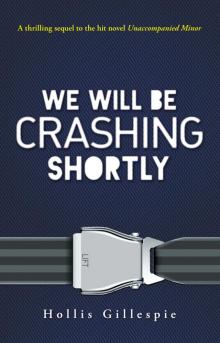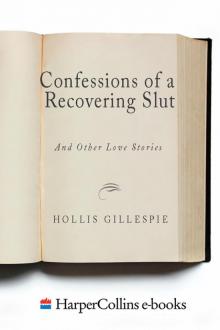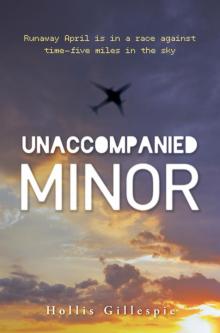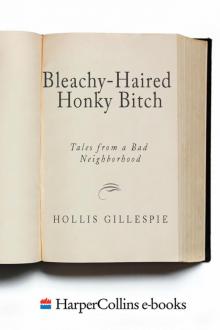- Home
- Hollis Gillespie
Bleachy-Haired Honky Bitch Page 4
Bleachy-Haired Honky Bitch Read online
Page 4
They liked to tell me my laughter lowered their concentration level, until I said it was a good trade-off since their smoking lowered my life expectancy. My coworker Eugenia was as fond of her cigarettes as was our immediate boss, who would fervently puff away while devoting an entire day investigating whether “corn stick” was one word, two words, or hyphenated. Me, I felt it would be more fun to spend the day ripping out my own kidneys with a rusty crow-bar, so it didn’t take them long to turn on me.
They were gathering evidence to get me canned while I was gathering momentum to make their lives miserable. But one day I saw my boss sitting at his desk holding a big, shallow bowl of beef vegetable soup. It wasn’t an uncommon sight—for fifteen years I don’t think that man ever left his office for lunch hour—so I don’t know why it affected me so profoundly that day in particular. It just did. He dipped the spoon into the bowl, slowly scooped away from himself, and then slowly lifted the spoon to his lips. Hunched like he was, the psoriasis scabs on his scalp showed through his thinning hair. I had considered him mean, petty, unforgiving, and unfair—but then I saw him with that soup, and I had to leave.
I went outside, sat in my car, and sobbed. After a while, a woman from the sales department came up and said something to me through the window. She had misinterpreted my tears and meant to comfort me. “From the first day we saw you in that office,” she said, “we’ve all been saying you don’t fit in.” She meant it as a compliment.
I’ve had other jobs—coat-check girl on the docked Queen Mary in Los Angeles, beef-log sample giver at Swiss Colony, and waitress on the graveyard shift at a coffee shop in San Diego when I was seventeen. I remember that one in particular because of the night a drunk reached up and pinched my nipple through my uniform while I poured him a cup of coffee. Nearby sat the owner of a mid-scale Mexican restaurant located down the street. He regularly stopped in for eggs and an English muffin after his place closed for the night. His restaurant had regular hours and a better clientele, so I approached him and asked for a job, figuring a healthier environment would do me some good. His response was to tell me I was lucky to have the job I had, which caused me to become more angry at him than I was at the nipple-pinching dickwit, because it’s a fathomless insult to tell an idealistic teenager she is “lucky” to make a living that includes having to tolerate being pawed by wasted pigs. In response to his remark, I sat the coffee pot down on his omelet, took off my apron, and left.
In keeping with the curse of financial foolery I inherited from my parents, I spent the money I made during this period on rounds of margaritas for my friends and dates at the Del Mar racetrack. My recently divorced mother bought a sleek Datsun 260Z, even though she couldn’t drive it because she had broken her left foot while hang gliding in Mexico a month earlier. She could have used that money as a down payment on the beachfront condo we were renting at the time, but sixty thousand dollars was “laughably expensive” for a place with only two bedrooms, she said. Today that place is worth half a million.
These days I still lack knowledge of what to do with money other than pay bills and buy more rounds, but lately I’ve been having a hankering for “holdings,” even though I’m not sure I know what those are. I dream of owning a home of my own. I mean that literally too. In my dreams I’m always checking out houses, assessing their cabinets and ceiling height, their “curb appeal.” None of them are ever right, and I hate it when I have those dreams. I wish I would find a fucking house, even if it’s just in my head, but I keep moving from empty house to empty house and all of them are somehow off, like the view to the beach is blocked or the street out front is too busy or there are no doors. God, I hate those dreams, which always make me feel like I’ll always be homeless.
But then that feeling fades and eventually I’ll start dreaming different dreams, like I’ll start thinking maybe I can pull it off, this homeownership thing. Maybe I could clean up my credit, save some money, and one day actually own a home of my own. Maybe I will, after all, outlive a gypsy fortune-teller’s recent assessment of me: “You have no trouble acquiring money,” she said as she peered into my palm, “you just have trouble keeping it.” Then she charged me twenty-five dollars.
Eight Naked Strangers
Recently I was staring at eight naked strangers. One of them was so deeply tanned I’d taken to calling her “Suitcase Face,” another had a body like a pail of paste, another had tits so fake she could use them to caulk bathtub tile. And the men were really laughable. One had a gut so big it hung down low enough to cover up all his naughty bits, and another had no ass at all, just this weird concavity where his butt should have been.
They were splayed out by the pool, marinating themselves in sunlight like sacrifices offered up to the cancer gods. I hope they didn’t see me up there gawking at them through my window, appreciating one of the perks of scoring a room that overlooked the hotel sundeck on a rare sweltering day in Switzerland. “How did that lady live to be a hundred?” I asked myself, eyeing a wizened twig whose skin had baked into beef jerky. Surely, with all that sun exposure, she’d have grown a sarcomatous tumor the size of a Siamese twin by now. But then I realized she might not be that old after all—it could just be the aging effects of the sun. It ages you, doesn’t it? And the nakedness. The nakedness probably didn’t help.
I remember being naked in public only once. Notice I say “remember,” because Lary swears six years ago he practically had to tackle me to keep me from stripping on the streets in Prague, which makes no sense at all to me. I remember nothing like that happening that night, though I do remember Lary trying to convince a gay Czech street hustler that I was a pre-op transsexual, telling him I’d be happy to drop my pants to prove it. I don’t remember this striptease he claimed I performed, though the next morning I did notice that the spaghetti straps on my blouse were ripped. But that could have happened a number of ways, like during the drunken “hump dance” I did on the bar with some circus performers.
I’ve been naked in public before, just not always knowingly. In college I once went dancing with a handsome frat boy, and I wore black lace stockings under a dress of airy material that buttoned down the entire length of my back. I remember noticing all these people watching me as I shimmied on the dance floor, and here I thought it must be because I looked so damn hot. I discovered later, though, that my groping date had earlier undone almost all the buttons down my back. So the whole time these people were not watching me because I looked so damn hot, they were staring at me because my tatty ass was hanging out the back of my dress. It took me an entire decade to stop dying of embarrassment over that.
But there is more than one kind of nakedness, because that is nothing compared to the state of nakedness I was suffering when I met Lary. Back when I first moved to Atlanta, when I was lonely and worked at a clique-afflicted coffeehouse because I had no better way to waste my time, I could not possibly have been more miserable, and I don’t think I had a single damn friend except Lary. I’d met him months earlier at the wedding of his ex-girlfriend, a lovely person he was a fool to let slip away, but if Lary is not foolish he is not himself. Thank God. We bonded like a broken teacup, Lary and I, all the freaky shards of our damaged personalities fitting together to form the bride of Frankenstein, but by that time Lary had already grown the crab shell he likes to keep around his heart.
I was a different story; I was all out there. I was fresh from just having lost everything: my last parent, my live-in boyfriend, my home, my youthful incorruptibility, the last remnant of my ragged optimism, and my ability to keep it all inside and covered up. God, I was as shattered as a wrecked windshield and just as transparent, and I wore it like the opposite of a bulletproof vest, wide open and just too much to conceal. My state of wretchedness leaked out of me for everyone to see.
I swear, it was like the ass of my emotions was always hanging out. I was a shipwreck; fascinating from a distance but you wouldn’t want to be in one. I hadn’t built the emotional damn yet, didn�
�t even know how, and about four minutes into a conversation with me people would literally begin to back away from the flood.
The Perfect Father
Like I’ve always said, there are advantages to being the daughter of an alcoholic trailer salesman. For example, I learned how to make the perfect Bloody Mary before I turned ten. My father didn’t teach me—he favored beer, as evidenced by his favorite hat fashioned from flattened Budweiser cans bound together by blue yarn. No, it was a bartender named Kitty who taught me. “Angel,” she’d say as she lined up the various canisters needed to concoct the drink, “this here is the perfect Bloody Mary.”
Kitty worked at the Thin Lizzy in Costa Mesa, where my father hung out. Kitty had the cackle laugh of a chain-smoker and bleached hair that was teased into a beehive helmet. She shot the breeze with my father while I drank Shirley Temples, ate potato chips, and perfected my pool game. My father didn’t play pool but placed bets on me nonetheless. The secret ingredient in a perfect Bloody Mary, by the way, is one dissolved cube of beef bouillon. My father hated Bloody Marys.
“Making more red vomit, Kitty?” he’d say.
“Get the hell out of here, you useless sack o’ crap,” laughed Kitty, who was quite crusty. She always made my father chuckle. It didn’t work for me, though, because later—thinking I had the green light from Kitty—I myself jokingly called him a useless sack of crap and his response was to beat the crap out of me. My mistake, I think, was that I was not handing him a beer when I said it.
There are other benefits to being the daughter of an alcoholic trailer salesman, such as wisdom. For example, my father always kept packets of peanuts scattered about the front seat of our family Fairlane. He once told me conspiratorially that peanuts mask booze breath better than peppermint gum. That there is knowledge, if you ask me.
He would always put me in the front seat of the car and insist that I not wear a seatbelt. “You don’t want to wear a seatbelt,” he said, “because if you’re strapped in, you can’t get thrown clear of the wreckage. It’s always better to get thrown clear,” and he’d finish by waving his arm in a sweeping motion, as if to indicate that, at the moment of impact, my prepubescent body would fly out the window and float down on a distant patch of cushy clover.
“Because blue-eyed angels don’t die in car wrecks,” he’d say, “they get thrown clear.”
My mother disagreed with him. “With that logic,” she would yell at him, “you should just let her sit outside on the hood of the car, because that’s where she’s gonna end up anyway.” But still I sat, unstrapped, eating peanuts and laughing as my father ran red lights and popped curbs.
He once ran over a lady’s foot, but that’s because she deserved it, he said. “Anyway, she’s walking fine,” he observed as we watched her scramble away. I was impressed with how fast she could run with that limp.
The main benefit to being the daughter of an alcoholic trailer salesman was the trailers themselves. My dad’s trailers were nicer than our houses, and we preferred campgrounds that were more like concrete parking lots, with “hookups,” whatever those are (I just know we always drove around until we found a campsite that offered them).
My father let me cook on our camp-outs, and one night I put the steaks on the grill when the coals were too hot, so the meat caught fire. The flames shot so high I thought pigeons would fall—fully charred—from the sky. I frantically doused the grill with a bucket of water, and when the smoke cleared the steaks were covered in ash. So I speared each one, hosed them off, then refired the grill and started over. My father watched the whole process from his lawn chair, Bud cans both on his head and in his hand. He barely raised a brow.
“Angel,” he said later when I served him dinner, “this here is the perfect steak.”
Drowning
My little sister was saved by our dog once. She was on her way to the pool in our apartment complex and, since she was only eleven months old, faced certain death, no doubt. I was just three myself, but I remember that day, as I do the day my parents brought her home after she was born. “Look what we found in the hospital parking lot!” my father exclaimed that morning, wheeling the carriage into the room. That is about all I remember of that day, except for the fact that I never got a good look at the baby. People were constantly crowded around her carriage like car wreck witnesses, and she was so swathed in cotton she might as well have been a bundle of underwear. I couldn’t figure out the fuss, but the fuss soon dissipated. I mean, this was my mother’s fourth kid, after all. I was her third.
The day Kimberly came home from the hospital, while my father was joking with the well-meaning neighbors and the extended family members with whom we were still on speaking terms, my mother sat alone on the patio, smoking her fourth menthol that morning. “Did you hear what I said, honey?” my father called out to her above the hearty guffaws of the visitors. She nodded and waved from the other side of the sliding glass door, mouthing the words “parking lot.” Most likely she had heard it before, another of my father’s well-worn shticks, which he probably pulled out and performed at all their previous spawnings. “Look what we found in the parking lot,” my father repeated, slapping his knee.
I don’t remember how my sister, eleven months later, actually came to be in a parking lot, alone and unnoticed by all except our smart mutt Echo, but she would have had to crawl across one to get to the pool. Evidently Echo stood between my sister and the water and barked so menacingly that it kept my sister from advancing. This drew the attention of our neighbor, a large Hawaiian lady with flared nostrils and black hair piled in a bun as big as a bicycle seat on top of her head. The scene startled her out of the hammock she had hung in her living room, and she bustled over to our place to knock on our open door and tell my father that my baby sister was at that moment being attacked by a dog down by the pool.
My father darted past her and across the parking lot, where he saw Echo holding vigil near the pool’s edge, where my sister wailed like a frustrated little seal, unable to reach the water and commence drowning. I’m told there was no tearful clutching of my sister to my father’s chest or anything, no shower of kisses on her cherished face and precious blond head. No, he simply took her by the hand and led her back home, where he opened another Budweiser and fashioned a barricade out of dining room chairs to keep my sister’s wanderings isolated to the area between his feet on the ottoman and his favorite game show on TV.
After that my mother insisted that Echo sleep inside with us, rather than on the patio behind the sliding glass door, even though it meant that our home became so infested with jumping fleas you could actually see them en masse like a little dusky cloud that always stayed at ankle level above our carpet. It was two years after saving my sister that Echo gave birth to the litter of puppies under the big wooden desk in my brother’s bedroom. They were sweet little mutts like their mother, with coats of red fur that would turn wiry one day.
Then came the afternoon I thought it would be fun to place one of them on the end of a tennis racket and flip it like a furry little burger. When, weeks later, the guy who adopted it demanded another one because that one had died, my mother told me not to blame myself. “Some puppies don’t make it,” she said with little sentiment.
Echo, though, was a different story. That dog became a conduit for my mother’s sanity, a loving presence in the midst of an often unloving marriage fraught with blame and broken dreams. Often I would find my mother asleep on the couch in the morning, clutching Echo like a life preserver. When Echo died a decade later, it was my mother who found her curled up in the garage, under the big wooden desk that used to belong to my brother. She closed the door and wouldn’t let us come inside. My sisters and I hovered by the door waiting, but my mother stayed in there all morning, holding vigil over our old mutt Echo, the sweet old dog that saved people from drowning.
Piercing Experience
I’m not suicidal, but sometimes I look around and wonder if I need any more evidence that I’m was
ting my life. I don’t date. My three best friends are men, none of them romantic prospects (except possibly for each other). Two of them, Daniel and Grant, are addicted to colonics and take great pleasure in calling me with daily updates detailing their stool consistency. The other, Lary, drives a rusty BMW with big, plastic, biblical characters stolen from a lawn nativity scene sitting upright in the backseat like cab passengers. One of our favorite things to do together is go to the Clermont Lounge, where the strippers are all flawed in the most amazing ways. One is so fat we’ve nicknamed her “Butterball.” Another has so many tattoos she doesn’t even look naked when she’s naked. Another is the survivor of a botched boob job and had to have her implants removed, so now her tits just dangle there, withered, like two turkey wattles.
We pass out money and sit there, completely certain that we’re safe from meeting anyone remotely right for us. Sometimes a girlfriend will advise me to get away from these guys, to move to more conservative Sandy Springs and live in a stylish apartment building, which is known as an outpost for single airline pilots, rather than the renovated telephone factory where I now reside. But then I look at my job, which is artist/writer/photographer/flight attendant/foreign-language interpreter, and my office, which is decorated with plywood signs stolen from the roadside, and the bumper sticker on my car, which reads “Teenage Prostitute to the Stars,” and I realize, Oh my God, I belong with these people! So I’ve resigned myself to my place with them, and with that resignation I figure I might as well get myself pierced.

 We Will Be Crashing Shortly
We Will Be Crashing Shortly Confessions of a Recovering Slut
Confessions of a Recovering Slut Unaccompanied Minor
Unaccompanied Minor Bleachy-Haired Honky Bitch
Bleachy-Haired Honky Bitch